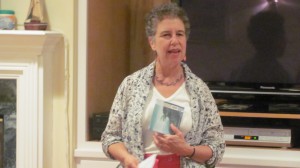I was recently asked to respond to some personal questions about my career as a composer. Thought it might be nice to share them here. The original questions were from Cross Island, a cello/piano duo in the New York area.
We’d love to have a brief statement about what has led you to make the career choices you have. What first led you to be composer?
Like most professional musicians, I was drawn to music from an early age. One of my earliest memories is hearing our next-door neighbor practicing the piano (we kept the windows open in the summertime in the pre-air-conditioned South), and running over there to sit on the edge of her living room sofa and listen. I must have been about 2 or 3 years old.
When I was 3, our family bought a piano for my older sister to start lessons. I played by ear until I was 7, when I was finally “old enough” to have piano lessons, too. I studied piano all through high school, memorizing and performing the classics. I liked to improvise at the piano, but my mother would always tell me to stop “messing around” and practice! At one point, my teacher attended a clinic where she was encouraged to introduce composition to her students. She suggested I write something, and I remember the piece I came up with. It wasn’t so great, and neither of us knew how to make it any better. We both decided I just didn’t have that gift.
After high school, I continued private lessons at the Longy School of Music while I was attending Harvard/Radcliffe College. I majored in Latin American History, but took music major classes and performed recitals on campus. I regarded music as an avocation, but my piano teacher, Alice Wilkinson, always urged me to give music a chance before deciding on my career path.
After a year working as a Spanish-speaking social worker in Children’s Hospital Medical Center, I decided I’d better take time out for music before continuing on in clinical psychology or social work. I enrolled at the New England Conservatory as a special student in piano performance to see how it felt to be in a totally musical environment.
My teacher, Irma Wolpe Rademacher, was quite inspiring. I remember leaving NEC one afternoon after a lesson on Chopin, and almost floating down the steps. I looked around at all the other students who had chosen music for their life work and decided if they could do it, maybe I could, too.
I continued at NEC for a 2nd Bachelors degree (B.M.) and then M.M. in piano performance. My life changed when I signed up for a newly offered elective, “Composition for non-majors,” taught by William Thomas McKinley, a new professor recruited by (NEC president) Gunther Schuller.
Tom’s assignments were like written improvisations, and I loved them. Our final project was to write a woodwind quintet. I remember working on my quintet in one of the big practice rooms at NEC, and loving the process of imagining how the horn would blend with the oboe. I was also preparing for my master’s recital, and had to tear myself away from composing in order to practice the piano. I told myself that as soon as I finished that degree, I would plunge into composing all the way. And that’s what I did.
Has being a woman composer had any impact – positive or negative – on that aspect of your career, or influenced your choices?
Yes, definitely! Part of my surprise at becoming a composer is that it was one of those careers women rarely pursued. There was only one female composition major while I was an undergrad at NEC, and it seemed weird, almost presumptuous, for a woman to write music. Of course, there were pedagogical piano pieces written by women, but as far as I knew, all the great music was written by men.
One night, I was out with a woman friend attending a concert at NEC, and she was adamant that she was tired of memorizing music by dead males. That statement made an impression on me. At the concert (by students in the Third Stream department which emphasized improvisation), my friend Marty Ehrlich was improvising on his soprano sax. Marty’s music sounded like it was coming straight from his heart into the air, and I longed to do that, too. When I had the choice of an elective the next semester, I was deciding between the Third Stream class and the composition class. I decided on the composition class. Sometimes I wonder what would have happened if I had gone the other route, but I think composition was the right choice for me. I love the craft of composing.
Also, during this period, the mid ‘70s, I was involved in the second wave feminist movement in Boston. There were consciousness-raising groups all over the city where we were re-examining our role in society. We encouraged each other to pursue dreams that might have seemed off-limits because of gender bias. That environment gave me courage to continue in composition.
Another influence was spiritual. During this same period, Eastern meditation was being introduced in the West. I decided to try Transcendental Meditation (TM), and learned to meditate twice a day. In the introductory sessions, we were told that meditation could release pent-up creativity. I know that was the case for me. When I started composing more seriously, I would go into a slightly altered mind-state to get into a stream of consciousness, and follow the music as it was coming. I still do that, to some extent, especially when a piece is in the formative stages.
What else do you do, outside of composition?
I am passionate about protecting our environment, and have been active in local environmental issues. Recently I was a citizen intervenor with the Public Service Commission when SC Electric and Gas applied for a permit to construct a new nuclear power plant nearby. (The permit was granted, but at least they had to fight for it…)
I love spending time outside, especially on the beach or walking along the river or lake. And reading in my hammock in the back yard, which we keep in a “natural” state. Also enjoy exercise and yoga.
I have become very interested in Jewish learning and practice, and am active in the Jewish community here in Columbia, South Carolina. I enjoy leading services in my synagogue, and co-lead a Jewish meditation group.
I am a member of an interfaith group for women here in Columbia called Women of Faith. I’m also on the board of the International Alliance for Women in Music.
We raised three children, so that took a lot of my time when they were growing up. Now they have moved to other cities (Washington, DC, Brooklyn, NY, and Boston), but we visit frequently. We especially enjoy seeing our three granddaughters, now ages 3, 2 and 6 months, who live in Brooklyn.
I also help keep track of my parents, now in their 90’s, to make sure they are doing ok. They are very independent, but I like to visit frequently, driving back and forth to Wilmington, NC, where they live.

